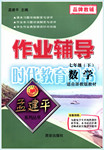题目内容
—Do you have any idea why Jenny left the firm?
—Probably, she _______ for a pay rise, but was turned down.
A. has held out B. has been holding out
C. held out D. holds out
练习册系列答案
 作业辅导系列答案
作业辅导系列答案
相关题目
题目内容
—Do you have any idea why Jenny left the firm?
—Probably, she _______ for a pay rise, but was turned down.
A. has held out B. has been holding out
C. held out D. holds out
 作业辅导系列答案
作业辅导系列答案